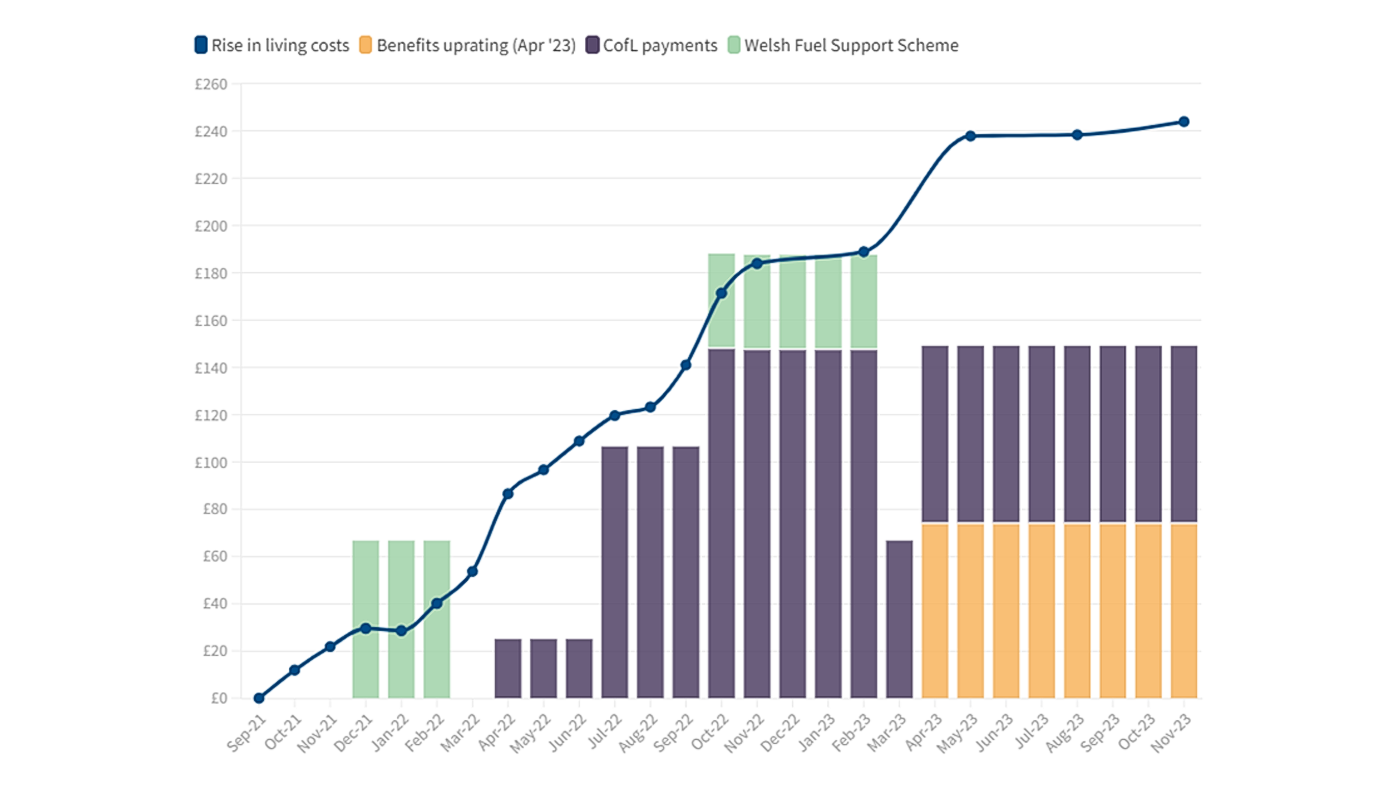Expert Opinion: Cost of Living Crisis

Cost of living to worsen for social tenants unless UK and Welsh Governments act fast - CHC expert warns
Community Housing Cymru’s policy and external affairs manager, and cost of living lead, Hayley MacNamara details how the ongoing cost of living crisis has heavily impacted the lives of social housing tenants - and how it only looks set to get worse.
As the nights get lighter and the weather starts to get warmer, I’m really looking forward to turning the heating off and not counting the cost every time my boiler clicks. I say this from a place of immense privilege that I’m even able to have the heating on.
The reality for many people is that they are simply looking forward to sunlight warming their homes in the coming months, because energy costs have meant that the boiler hasn’t been on much this winter - it's simply too expensive.
Since it began in late 2021, the cost of living crisis has hit social housing tenants hard in particular. Many people who live in social housing are on a low income or fully reliant on welfare benefits, so a large part of their money already goes towards the cost of simply running their homes.
But as food, fuel and energy prices have continued to rise, making ends meet has become a daily challenge - and the situation is unlikely to improve anytime soon.
The Resident Voice Index survey recently revealed that nearly eight in 10 social housing tenants (78%) are worried all or most of the time about meeting monthly living expenses - a 10% increase on spring 2022.
I was struck by Citizens Advice’s findings, shared on its cost of living dashboard, which captured insights from their services, in January 2023. The following graph is a worrying illustration of what low income households in England and Wales can expect in terms of costs and support in the coming months.
Living costs are expected to rise through spring, plateau throughout summer and rise again in autumn. At the same time, we will see UK and Welsh government help - in the form of the fuel support scheme and cost of living payments - decrease.

In Wales, Welsh Government’s long-term strategy is to address future energy costs for social housing tenants by improving the energy efficiency of homes through schemes such as the Warm Homes programme.
While housing associations support and are working towards achieving this aim, it doesn’t address the short term continued increase in energy costs faced by social housing tenants, who have been reliant on the government’s winter fuel support scheme and the energy bills discount scheme.
This desperate situation is further compounded for social housing tenants because they pay disproportionally more for energy. People on prepayment energy meters typically pay more because of expensive standing charges applied by some energy suppliers, and almost half of Welsh social housing tenants use prepayment meters.
Worryingly, some tenants have also experienced the forced installation of prepayment meters during the ongoing crisis, and we are pleased to see that Ofgem and the UK and Welsh governments are looking seriously at this practice, after concerns were repeatedly raised by Jack Sargeant MS, amongst others.
As housing associations work to support tenants on the ground, ensuring they access all the support they are entitled to, we have been working with the sector to press the UK and Welsh governments to reduce the pressure of energy costs for all Welsh social housing tenants.
As detailed in our Time to Act report, we are continuing to call for:
Expensive standing charges on prepayment meters to be removed, immediately
A new reduced social tariff to be created for those in fuel poverty, and
A mandate that energy suppliers prioritise the replacement of prepayment meters with smart meters when a tenant moves out.
Since we published this report in October 2022, we have seen some progress, including UK Government’s announcement that it will continue to provide energy cost support to businesses via the Energy Bill Discount Scheme (which will apply to housing associations, including care home settings). However, with prices still high, it remains to be seen if this next stage of support (as compared to the previous Energy Bill Relief Scheme) will be truly relative to the anticipated reduction in wholesale energy prices.
The UK Government’s Spring Budget was an opportunity to address these challenges. We were pleased to see the Chancellor announcing that from 1st July, charges for prepayment meters will be brought in line with comparable direct debit customers - however these changes will be too late for struggling social housing tenants.
In November, we met with Jane Hutt, Minister for Social Justice, to offer a longer term solution that would help provide support for social housing tenants now: the creation of a social tariff. The minister has since met and progressed discussions with Ofgem on the creation of an energy bills social tariff, but we were disappointed to see that this didn't feature in the Spring Budget.
Welfare as a vital safety net
The rising cost of energy bills, and indeed the whole cost of living crisis, has made
the removal of choice for the people who are most deprived in our society more stark than ever. So many have had to choose between eating and heating, and this is a poignant reminder of how crucial the safety net of good housing and appropriate welfare support is. We need to ensure that the welfare system provides sufficient support so that they never have to consider choosing between essentials.
We are actively recommending that existing welfare policies are improved and the fraying safety net strengthened, including through increasing the Universal Credit Standard Allowance.
Others are saying similar things as us: a report produced this month by the Trussell Trust and Joseph Rowntree Foundation recommends reforming Universal Credit to ensure that the minimum level of support guarantees that people can pay for essentials. Their analysis shows that currently 90% of low-income households on Universal Credit are going without essentials. Instead, they propose an ‘essential guarantee’, which would need to be at least £120 a week for a single adult and £200 for a couple.
UK Government will be increasing benefits from April 2023 in line with inflation, but as demonstrated in the Citizens Advice predictions, it is likely to be too little too late. In 2021, we published evidence in our A Lot to Lose report which showed that - even before the cost of living crisis - the Universal Credit baseline support for daily living costs was too low to help people make ends meet.
Warmer weather returning to the UK doesn't mean that things will automatically get better. The cost of living crisis is not just a winter problem. In fact, it is predicted that the economic hardship will get worse for low income households. The end of energy support schemes, and the still high costs of food, fuel and basic necessities mean that people will still struggle, and will need extra support just to get by.
The choice to cut back has become a privilege. For many social housing tenants the cloth has already been cut in more ways than one, and housing associations are seeing more and more of the people that live in their communities reaching crisis point.
What are Welsh housing associations doing?
Housing associations in Wales take their role of supporting tenants through challenging financial times very seriously, and do all they can to ensure people live in safe, suitable, comfortable and affordable homes, including delivering financial resiliency services as part of their core business.
All tenants are able to access these services at any time during their tenancy, but worryingly they are currently in very high demand as people seek more advice than usual.
Another indicator of the increasing difficulties that people are facing with food and energy bills, is the increase in demand for housing association hardship funds. This is despite housing associations sourcing additional time-limited funding to boost their energy advice services and community welfare support.
If you are a housing association tenant who is concerned about or is struggling with rent and household costs, please contact your housing association directly as soon as you can. A specialised, local team is in place to support you.
What support do social housing tenants need now?
The end of Welsh Government’s winter fuel support scheme and the predicted continued increase of basic living costs will inevitably lead to more people seeking financial support. We are calling on Welsh Government to ensure that existing routes to financial support - including Discretionary Housing Payments and the Homelessness Prevention Fund - are sufficient, have a clear route to access, and are delivered in partnership with housing associations in order to maximise reach.
Housing associations are uniquely positioned to identify and support the most vulnerable members of society through the cost of living crisis. By working in partnership with housing associations, Welsh Government can target support to those who need it most.
For more information on our cost of living work visit our in-depth cost of living hub.
For media queries contact media@chcymru.org.uk